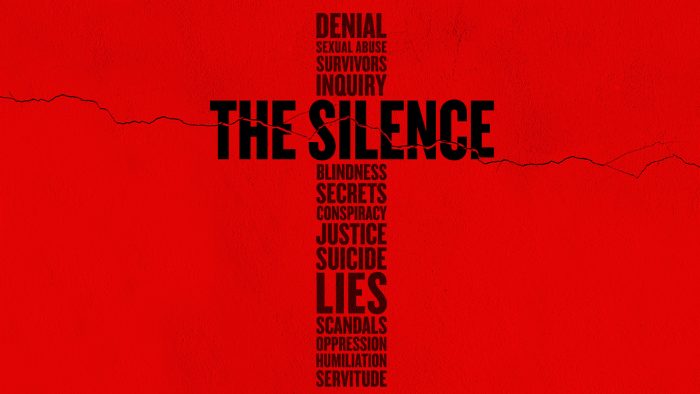
November 16, 2020 – Moncton – National Film Board of Canada (NFB)
Now playing at Cinéma du Centre in Caraquet and Cinéma Péninsule in Tracadie, Renée Blanchar’s new feature documentary Le silence (The Silence) will also be shown at Cineplex Cinemas Dieppe, starting Friday, November 20. The theatrical release of the original French version of Le Silence follows the film’s world premiere at the Festival international du cinéma francophone en Acadie (FICFA). A Ça Tourne Productions/NFB co-production in collaboration with Radio-Canada, the documentary sensitively tackles a difficult topic: the sexual abuse perpetrated by Catholic priests against young boys in francophone New Brunswick. The subject couldn’t be more relevant, as it joins the long list of pedophilia scandals tarnishing the Catholic Church in Canada, the United States, and elsewhere in the world.
Confronting silence with truth, Renée Blanchar delivers a film that’s shattering, personal and necessary. Deeply rooted in her community, Blanchar learned that she had unknowingly come very close to this oppressive secret while shooting her first documentary, Vocation ménagère (1996), in Acadian parishes. Now, with The Silence, she meets the victims, whose stories bear witness to their broken lives. They kept quiet for many years, but after making the courageous decision to accuse their perpetrators, these men can now hope for a kind of justice, and the beginning of healing.
What the press is saying
“Blanchar’s film makes you want to scream. The personal accounts are very disturbing and it’s clear the wounds haven’t healed.” – Sylvie Mousseau, Acadie Nouvelle
“A troubling film in its depiction of these men, our fathers and husbands, who have had to shoulder this burden alone.” – Camille Bourdeau-Potvin, Radio-Canada Acadie
“A film that will shake up their entire community and all of Acadie.” – Martine Blanchard, Radio-Canada Acadie
About the film
The Silence by Renée Blanchar (1 h 46 min)
Co-produced by Ça Tourne Productions (Maryse Chapdelaine) the NFB’s Canadian Francophonie Studio in Moncton (Christine Aubé), in collaboration with Radio-Canada
Why be silent about the most serious matters? Doesn’t silence perpetuate suffering? From the 1950s to the 1980s, Catholic priests sexually abused many young boys in the francophone towns of New Brunswick. These scandals only came to light when the victims were in their fifties and older, provoking shock and outrage in the media and the public. Why did the affected communities keep silent so long, preferring secrecy to justice and truth? Profiting from their positions of influence to impose a “pious silence” on their parishioners, some authority figures seem to have built, in a way, an abusive system that tells us as much about the type of oppression specific to the Acadian population as it does about the blanket denials issued by the Catholic Church. Called to confront the power of this collective silence, veteran filmmaker Renée Blanchar meets with survivors in an attempt to untangle the deeply rooted reasons for this secrecy. With The Silence, she takes us as close as she can to the humanity of these broken men, revealing the multiple and far-reaching consequences of silence, not just for the communities affected, but for the Acadian community as a whole.
About the filmmaker
Filmmaker Renée Blanchar studied cinema in France before returning to develop a successful career in film and television while working from her hometown in New Brunswick. Her work has in many ways blazed a trail not just for Acadian cinema but for women in the film industry everywhere. Renée made her mark in television drama as the director of the series Belle-Baie for five seasons (2008–2012). Her documentaries, including her most recent film, The Silence, are noted for their powerful subject matter and their ability to reveal the depths of the protagonists’ humanity. Raoul Léger, la vérité morcelée (Raoul Léger: The Elusive Truth, 2002) and On a tué l’Enfant-Jésus (A Hospital Crucified, 2007) were winners of the La Vague Prize for Best Acadian Film at the Festival international du cinéma francophone en Acadie (FICFA), and Les héritiers du club (A Place That Matters, 2014) and Nos hommes dans l’Ouest (Shadow Men, 2017) were presented as opening films at FICFA: all these documentaries resonated strongly both within and beyond their own milieux. Almost all of her films were written and directed from her home base in the city of Caraquet, New Brunswick.
– 30 –
Related Product
Electronic Press Kit | Images, credits, poster, synopses: The Silence
Associated Links
Festival international du cinéma francophone en Acadie
Ça Tourne Productions
Radio-Canada
French version here | Version française ici.